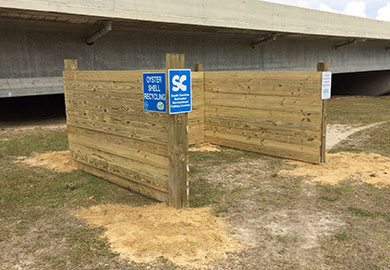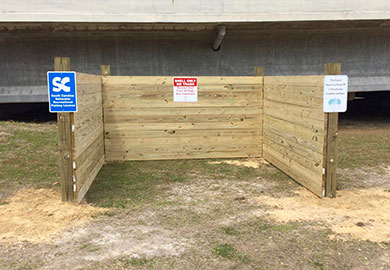DNR News** Archived Article - please check for current information. **
New oyster shell recycling site in BeaufortApril 13, 2017

The new oyster shell recycling drop-off sits in the shadow of the Chechessee River Bridge in Beaufort County. (Photo: Ben Dyar).
Recycling oyster shells just got easier for residents of Beaufort County.
South Carolina Department of Natural Resources (SCDNR) staff and partners recently constructed a new oyster shell drop-off bin at the Edgar Glenn Boat Landing in the shadow of the Chechessee River Bridge, the sixth such site in Beaufort County.
“With this new public oyster drop-off located directly between Beaufort and Bluffton, we’re thrilled to provide an opportunity for the public to recycle their oyster shells in this area, which before was a difficult task,” said Ben Dyar, who oversees the agency’s oyster recycling and planting program.
The drop-off is located on Highway 170 on the same side of the road as the boat ramps. The bin is a wooden, three-sided bin in the parking lot near the foot of the bridge, Dyar said.
The new location was funded with donations from Toadfish Outfitters, an oyster knife, fishing gear, and apparel company that has committed to contributing a portion of every product sold to oyster reef rebuilding efforts.
We’re pleased to be working with Toadfish Outfitters on this drop-off location and look forward to more to come,” Dyar said.

SCDNR shellfish staff completed the build in early April 2017 with funding from Toadfish Outfitters. (Photo: Ben Dyar).
Recycling oyster shells is a win-win for South Carolina’s environment and economy. Oysters are nature’s water filters, cleaning up to 50 gallons of water a day per oyster. Oyster reefs also provide excellent erosion control and habitat for countless other marine animals, including popular game fish, shrimp, and blue crabs, all of which start out their lives under the protection afforded by oyster reefs.
Every year, SCDNR staff plant tens of thousands of bushels of shell along the coast to rebuild the state’s oyster reefs. In 2016, those rebuilding efforts covered over two miles of shoreline. Recycled oyster shell is the best material for rebuilding reefs – but shell can be hard to come by and expensive to purchase. The disappearance of commercial oyster canneries and rise in the popularity of backyard oyster roasts has resulted in a constant shortage of available shell to plant.
That’s where the public can help. Whether you’re steaming singles for your family or roasting bushels for a crowd, help SCDNR rebuild reefs and keep South Carolina’s coast healthy by recycling your shells.
Over 30 drop-off sites across the state offer a convenient way to recycle oyster shells, and a limited number of temporary bins are available for large events. In addition to collecting shell from the public, SCDNR staff work with 30 restaurants in the Charleston area to recycle their oyster shells.
Find a drop-off site or participating restaurant near you.
Don’t like the taste of oysters but love the benefits they provide? You can still help support this work by purchasing a $10 saltwater fishing license, a portion of which goes to shell recycling each year, or joining a volunteer day with SCORE, the agency’s community-based oyster habitat restoration program.
Tips for Recycling Your Oyster Shells
The oyster shell public drop-off is located at the Edgar Glenn Boat Landing at the Chechessee River Bridge on Highway 170. The drop-off bin is on the same side of the road as the boat ramps. The bin is a wooden three sided bin in the parking lot near the foot of the bridge. .
- DO bring your shell to the nearest shell recycling center. Maps are available online. If a center is not shown near you, please call 843-953-9397.
- DO separate shell from trash. Shell mixed with trash (including shell in bags or containers) is not suitable for recycling. Provide separate containers at your events for shells and trash.
- DON'T put live or freshly shucked oysters in South Carolina waters. If the oysters you purchased were harvested outside South Carolina, it is illegal to place them in SC waters. Placing live oysters in our waters can create environmental problems and may harm local oysters or other animals. To avoid contamination, shell should be recycled to SCDNR and properly quarantined for six months.
| Area | Personnel | Number |
|---|---|---|
| Coastal, Midlands | David Lucas | 843-610-0096 |
| Marine | Erin Weeks | 843-953-9845 |
| Upstate, Midlands | Greg Lucas | 864-380-5201 |
After Hours Radio Room - 803-955-4000
